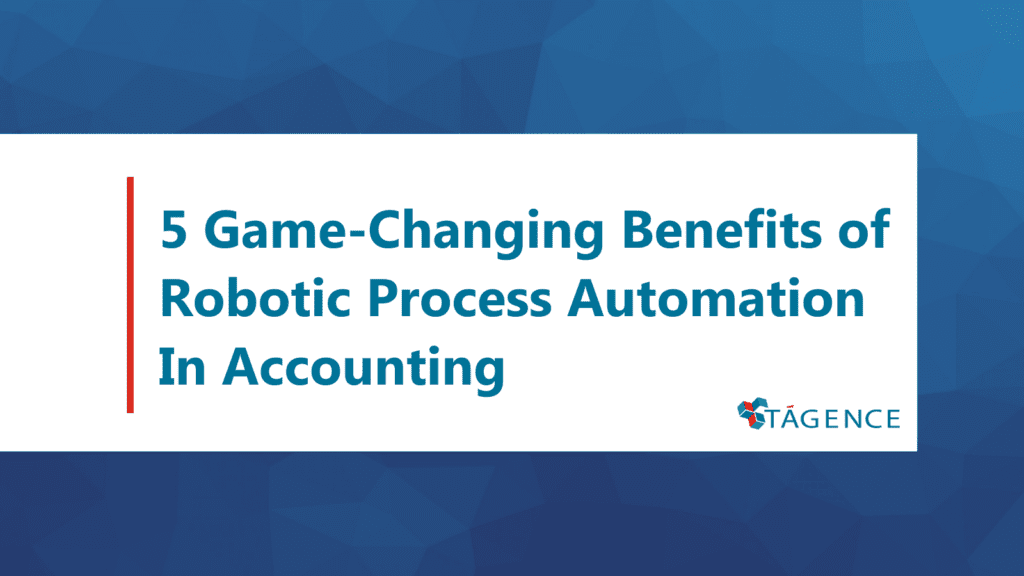
5 Game-Changing Benefits of Robotic Process Automation In Accounting
Most accounting companies are stuck with outdated processes, but technological advancements are rendering them obsolete. RPA is quickly catching on, even in the accounting sector. According to Gartner, by 2022, 90% of all large corporations globally will have adopted some form of automation.

If you’re still using spreadsheets and relying on manual processes to get work done, this blog will show you how accounting process automation will save you time and streamline operations.
Some of the significant points that we’ll cover include:
- What is accounting process automation?
- Benefits of integrating RPA into your accounting processes
- The top accounting tasks you can automate with RPA
RPA Accounting can mean a faster and leaner business within a short time. Check out our quick guide below.
What is Robotic Process Automation in Accounting?
There’s a reason why accounting is said to be one of the least happy careers in the United States; there are so many manual tasks, all of which are exhausting. A survey by career explorer revealed that accountants’ happiness is at 2.6 stars (out of 5 stars), putting them in the lowest 6% of careers.
Robotic process automation in accounting takes the tedious manual tasks, including accounts reconciliation, creation of financial statements, and financial records updates and automates them. Instead of building complex ledgers and manually keying in data, the software uses a pre-existing process and makes it automatic.
This automation eliminates the least efficient elements of accounting, leaving your employees with more time for exciting work and formulation of effective strategies.
What are the Top Benefits of Robotic Process Automation in Accounting?
There are several key benefits of automating accounts processes, all of which save the company a lot of money in the long run. A McKinsey report shows that the global automation potential for the finance and accounting industry is 43%.
Consequently, here’s why you should integrate automation into your accounting processes.
1. RPA Is A Big Time Saver For Accountants
Obviously, accounting is a highly time-consuming task. So it’s no wonder 40% of small business owners consider taxes and bookkeeping as the worst part of their entrepreneurial journey.
When you automate all your accounting processes, you leave your employees with more time to focus on tasks that drive business growth. It also saves them a lot of time during financial closing seasons as they don’t have much to reconcile.
In short, using robotic process automation enables them to perform a weeks’ worth of work in a day, ultimately enhancing employee satisfaction.
2. Robotic Process Automation Increases Data Accuracy In Accounting
Human errors, while they often seem insignificant, can cost you a lot of money. An IBM study revealed that US companies lose up to $3.1 trillion every year due to compromised data.
The beauty of accounting process automation is that the software rarely makes any errors. It can fill in multiple ledger entries within a short time, and your data quality will remain uncompromised. Your accountants will still have to verify and manipulate the data, but it will be error-free.
3. RPA Enhances Employee Productivity At Accounting Firms
Happy employees are a huge driver of business growth. Markedly, studies have shown that productive employees can increase your profit margins by more than 20%. When you leave most of the grunt work to the machines, your employees have more time to focus on more critical tasks. They can also get more work finished within a short time, allowing you to take on more clients.
4. RPA Eases Data Retrieval
Cloud-based storage is quickly taking over office cabinets, and for a good reason, because it’s highly convenient. More than 90% of people use the cloud to store files, while around 72% use it for data sharing. RPA allows you to easily access and pull data automatically, which significantly increases efficiency at accounting offices.
5. Using RPA In Accounting Enhances Customer Experience
Accounting is full of manual and repetitive tasks that often leave your employees exhausted. When you automate your processes, you give your employees more time to focus on high-quality, error-free work, ultimately enhancing customer satisfaction.
The Top Accounting Tasks You Can Automate with RPA
RPA is becoming more prevalent across various industries. For instance, Deloitte predicts that there will be nearly universal adoption of RPA at accounting firms in 5 years.
Some accounting processes you could automate include:
- Financial close and reporting
- Accounts payables and receivables
- Accounting reconciliation
- Expense reports
- Sales order process
- Payroll
The Role of RPA in Accounting
RPA is the future of business operations, therefore the accounting and finance industry is quickly adopting it. Automating accounting can speed up your business and release your employees to handle more complicated challenges. Additionally, it eases data storage and retrieval, enhances employee productivity, and eliminates human errors.
Implement Robotic Process Automation For AccountingToday!
Would you like to learn more about robotic process automation for accounting firms? Check out our blog for more resourceful guides!
